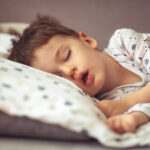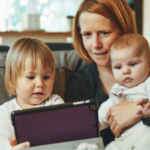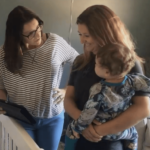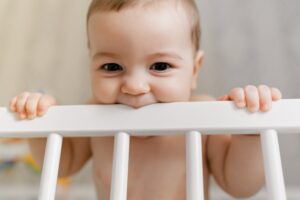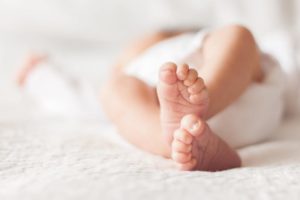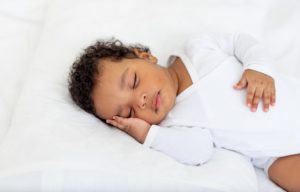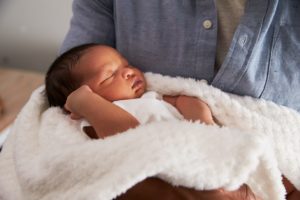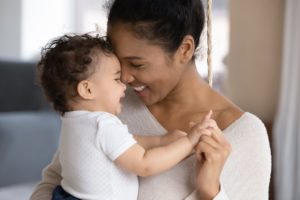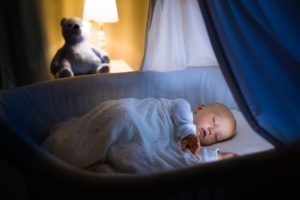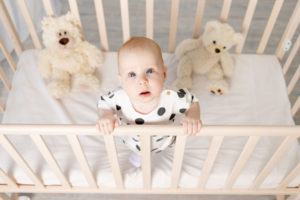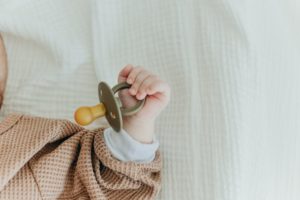When you buy through our links, we may earn a commission. Products or services may be offered by an affiliated entity. Learn more.
Newborn Snoring
Newborns make many different noises when they breathe, including snoring. Approximately 3% to 9% of infants snore regularly by the age of 3 months. In general, newborn snoring is rare and can be confused with other newborn breathing sounds.
Sometimes it is necessary to consult with a pediatrician to ensure there are no underlying medical conditions that need to be treated. We explore what snoring looks and sounds like in newborns, how to distinguish newborn snoring from other types of noisy breathing, and when to talk to a doctor.
Is Your Newborn Snoring?
Snoring may occur on its own or together with other types of labored breathing. Noisy breathing in newborns can occur for a variety of reasons. Approximately one-third of infants 6 months or younger exhibit noisy breathing , ranging from snuffles to wheezing and stridor.
To correctly identify whether a newborn is snoring, it helps to understand what causes snoring and how it differs from other sounds.
Snoring is a raspy sound that occurs during sleep. As muscles in the upper airway relax, they are more likely to obstruct the airway and allow air to vibrate as it passes through. Most children succeed in breathing normally despite these relaxed muscles, but for some, the increased narrowing causes snoring.
Several sounds a newborn might make while sleeping are particularly easy to confuse with snoring.
- Wheezing or rhonchi: Wheezing is a musical sound that can occur when inhaling or exhaling, whereas rhonchi are similar but usually lower-pitched. Wheezing affects about half of all infants under 1 year old. Many conditions can make newborns wheeze, including lower respiratory infections, structural issues in the lower airway, and inhaling small particles of milk or formula.
- Stridor: Like snoring, stridor also occurs due to restricted airflow in the upper airway. Stridor has a high-pitched monotone sound, and it can occur when breathing in, or breathing out. Infants with various types of structural anomalies in their airways can be more prone to stridor.
- Crackles: Infants with lower respiratory infections and other lung conditions may make a crackling sound when breathing. Crackles often need medical attention.
- Gasping or choking: Sleeping infants with central sleep apnea may have prolonged pauses between breaths followed by a gasp or deep deep. Newborns with obstructive sleep apnea may snore as well as gasp or choke.
During sleep, many newborns younger than 1 month old may briefly stop breathing and then have a period of breathing more quickly. This breathing pattern is normal , but it is not normal for babies to change color or breathe noisily.
Sometimes, an infant with noisy or troubled breathing may have a condition that requires medical attention. Seek medical help if an infant flares their nostrils , has a blue tint to the skin, feeds poorly, breathes shallowly or more slowly than usual, or shows other signs of labored breathing.
Help Your Baby Sleep Better With Pediatric Sleep Coaching
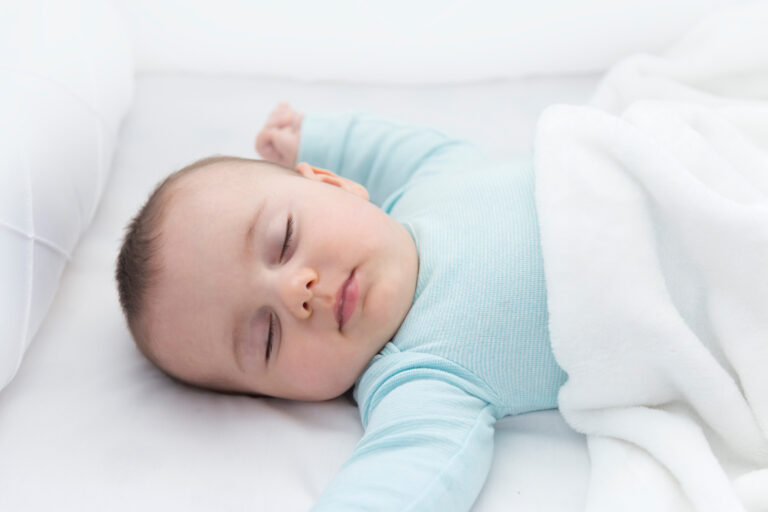
our partner at sleepdoctor.com
Learn More“Life-changing! My anxiety about my son’s sleeping habits were immediately reduced after talking to Sara. She went above and beyond to tailor a schedule to our goals, answer our questions, keep us on track, and check in to encourage us when we just thought we couldn’t do it anymore.”
Rachael B. – Verified Customer
What Causes Newborn Snoring?
Newborn snoring is a distinct sound that comes from the back of the throat due to the vibration of soft tissues. If a newborn snores softly and does not have any other symptoms, it may not be necessary to treat snoring.
Several factors can raise the risk that a newborn will snore.
- Deviated septum: The bone and cartilage dividing the two nostrils is called the septum. When the septum is not perfectly straight, a person may have trouble breathing through the nose, which can lead to snoring.
- Secondhand smoke: Living with an adult who smokes can increase a baby’s chance of snoring. Experts believe tobacco smoke may cause snoring by irritating or inflaming the airway .
- Baby formula: Some studies have shown that breastfeeding protects against snoring , so babies who bottle-feed may be more likely to snore.
- Conditions present from birth: Having Down syndrome or certain physical abnormalities present at birth, such as a smaller jaw, may increase the risk of snoring.
Sleep Apnea Symptoms in Infants
Infants with sleep apnea experience interrupted breathing while they sleep. This can result in sounds ranging from snoring to gasping and choking.
Frequent loud snoring is a common symptom of obstructive sleep apnea, a sleep disorder in which the upper airway narrows excessively and restricts the flow of air when breathing. Obstructive sleep apnea that starts during infancy is usually due to an anatomical factor that affects the shape of the airway or its ability to remain open during sleep.
In addition to snoring, infants with obstructive sleep apnea may also be more likely to display:
- Longer pauses in breathing
- Coughing or choking
- Noisy breathing
- Mouth breathing
- Nocturnal sweating
- Restless sleep with frequent awakenings
- Sleeping with the neck stretched out
Choking sounds may also be due to central sleep apnea, in which irregular signals from the brain lead to pauses in breathing. Central sleep apnea involves recurring periods of reduced or stopped breathing and a bluish tinge to the skin. In newborns, the condition is usually due to problems with the still-developing nervous system. CSA is more likely to occur in infants who have pre-existing medical conditions or have been given anesthesia or medications.
“Parents should pay attention to their baby’s snoring. Occasional soft snoring is normal and not a cause for concern, but if the snoring becomes loud and persistent, it could be a sign of sleep apnea.”
Dr. Pranshu Adavadkar, Sleep Physician
While sleep apnea in newborns is rare , it must be treated by a health professional to avoid the potential for growth problems. Parents and guardians should consult a pediatrician if their infant snores three or more nights per week or has other symptoms of sleep apnea. The doctor can collect a sleep history, perform a physical examination, and arrange for a sleep study if appropriate.

Newborn Snoring or Laryngomalacia?
Laryngomalacia is a condition present at birth that causes part of the airway to collapse when breathing in. Just as in snoring, this partial blockage of the airway causes tissues to flutter and make sound when air passes through. Laryngomalacia is the most common cause of long-term stridor, which is a wet-sounding, low-pitched sound during inhalation.
Unlike snoring, the symptoms of laryngomalacia can be present when the infant is either asleep or awake. For newborns, noisy breathing due to laryngomalacia is often loudest during sleep or when a child is relaxing, feeding, or agitated. Symptoms are usually worse when the infant is lying on their back and better when they are on their stomach.
Other symptoms of laryngomalacia include:
- Trouble feeding or swallowing
- Acid reflux
- Visible sucking-in of the skin in the middle of the neck or below the breastbone (in severe cases)
- Pauses in breathing or turning blue from lack of oxygen
When laryngomalacia symptoms are severe, they may affect feeding, sleep, and growth. Although children often outgrow laryngomalacia by the time they are 18 months old to 24 months old, parents and caregivers who notice symptoms of laryngomalacia in their children should talk to a pediatrician.

Still have questions? Ask our community!
Join our Sleep Care Community — a trusted hub of sleep health professionals, product specialists, and people just like you. Whether you need expert sleep advice for your insomnia or you’re searching for the perfect mattress, we’ve got you covered. Get personalized guidance from the experts who know sleep best.
References
8 Sources
-
Leon-Astudillo, C., Lee, G. S., & Katwa, U. (2019). An unusual case of noisy breathing in an infant. Journal of Clinical Sleep Medicine, 15(1), 149–152.
https://pubmed.ncbi.nlm.nih.gov/30621832/ -
Guilbert, T. W., & Lemanske, R. L. (2023, January 25). Wheezing phenotypes and prediction of asthma in young children. In G. Redding (Ed.). UpToDate., Retrieved January 30, 2023, from
https://www.uptodate.com/contents/wheezing-phenotypes-and-prediction-of-asthma-in-young-children -
Hong, H., Maloney, M. A., Keens, T. G., & Perez, I. A. (2018). Sleep in infants. American Journal of Respiratory and Critical Care Medicine, 198(8), 15–16.
https://pubmed.ncbi.nlm.nih.gov/30320526/ -
Weiner, D. L. (2022, June 30). Acute respiratory distress in children: Emergency evaluation and initial stabilization. In M. I. Neuman (Ed.). UpToDate., Retrieved January 30, 2023, from
https://www.uptodate.com/contents/acute-respiratory-distress-in-children-emergency-evaluation-and-initial-stabilization -
Rosen, G. M., Cavanaugh, K. L., & Roby, B. B. (2022, September 16). Mechanisms and predisposing factors for sleep-related breathing disorders in children. In R. D. Chervin (Ed.). UpToDate., Retrieved January 30, 2023, from
https://www.uptodate.com/contents/mechanisms-and-predisposing-factors-for-sleep-related-breathing-disorders-in-children -
Katila, M., Saarenpää-Heikkilä, O., Saha, M. T., Vuorela, N., & Paavonen, E. J. (2019). Parental reports showed that snoring in infants at three and eight months associated with snoring parents and smoking mothers. Acta Paediatrica (Oslo, Norway : 1992), 108(9), 1686–1694.
https://pubmed.ncbi.nlm.nih.gov/30791132/ -
Yau, S., Pickering, R. M., Gringras, P., Elphick, H., Evans, H. J., Farquhar, M., Martin, J., Joyce, A., Reynolds, J., Kingshott, R. N., Mindell, J. A., & Hill, C. M. (2019). Sleep in infants and toddlers with Down syndrome compared to typically developing peers: Looking beyond snoring. Sleep Medicine, 63, 88–97.
https://pubmed.ncbi.nlm.nih.gov/31606654/ -
American Academy of Sleep Medicine. (2014). The International Classification of Sleep Disorders – Third Edition (ICSD-3). Darien, IL.
https://aasm.org/


